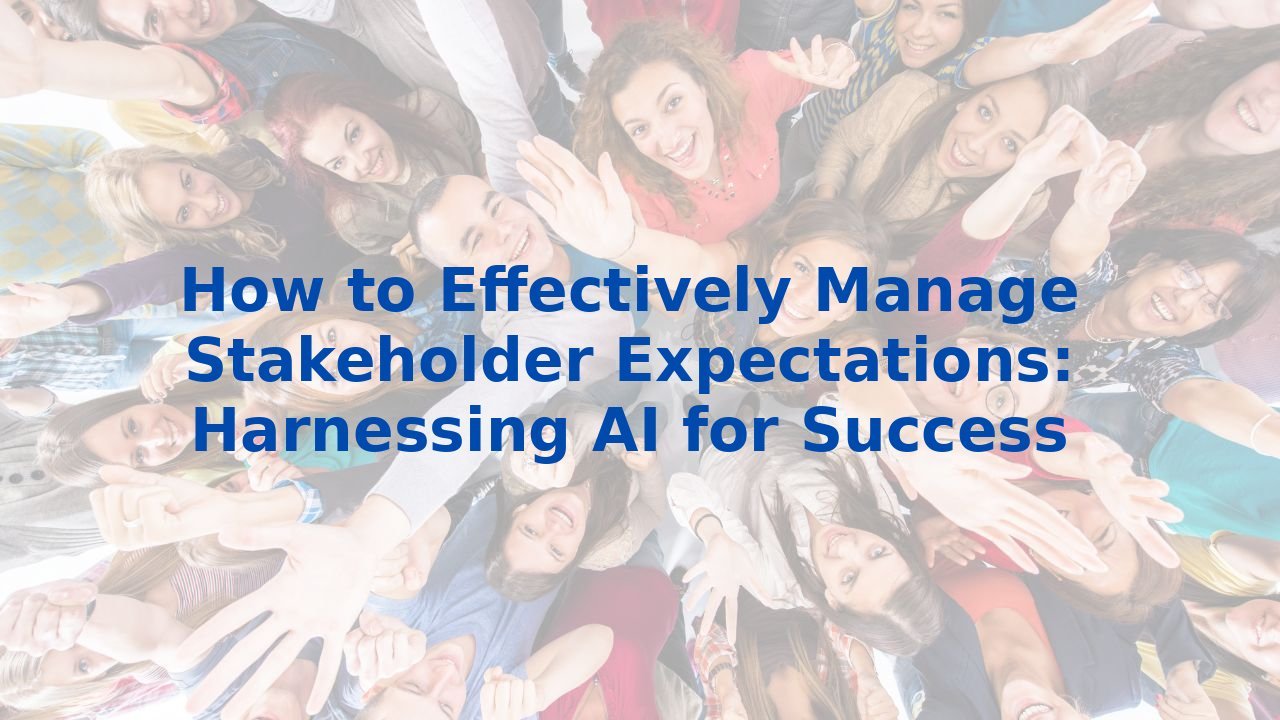How to Effectively Manage Stakeholder Expectations: Harnessing AI for Success
How to Effectively Manage Stakeholder Expectations: Harnessing AI for Success
Introduction
In the intricate web of product management, managing stakeholder expectations is paramount. Stakeholders, ranging from executives to customers, often possess varied and conflicting interests that could dictate the success of a project. In a rapidly evolving business environment, the application of artificial intelligence (AI) offers robust possibilities to optimize how organizations balance these expectations, paving the road for success.
The Challenges of Stakeholder Management
Engaging with diverse stakeholders necessitates a nuanced understanding of their unique interests and priorities. This isn't just about keeping everyone happy—it’s about strategically aligning their needs to foster a product that resonates in the marketplace. For example, executives may look for financial viability, while customers delve into the realms of quality and experience. The balancing act requires not just effective communication but also analytical capabilities that can interpret complex data.
How AI Enhances Stakeholder Management
Integrating AI into stakeholder management invites a transformative approach, where processes become more streamlined, and insights are amplified. Here’s how AI enhances stakeholder management:
1. Data Analysis and Insights
Imagine sifting through mountains of feedback and market data. AI cuts through the noise, offering insightful analytics that highlight trends and patterns. This intelligence allows decision-makers to pinpoint stakeholder concerns and address them proactively. By leveraging AI for data analysis, organizations can identify common issues from customer reviews and inform product development vertically.
2. Predictive Analytics
With AI-driven predictive analytics, businesses can foresee stakeholder reactions based on historical data. This foresight is invaluable; it empowers teams to navigate conversations and developments with greater confidence, tailoring responses that preemptively manage expectations.
3. Automated Communication
In a world drowning in information, personalized and timely communication is a rarity. AI can automate and optimize these processes. By ensuring that stakeholders are kept informed with relevant updates and personalized messages, teams can forge stronger relationships while keeping concerns at bay.
4. Chatbots and Virtual Assistants
AI isn’t just a backend tool; it can serve as a frontline support mechanism as well. Chatbots and virtual assistants are game-changers, offering 24/7 assistance to stakeholders. This omnipresence enhances the user experience and guarantees that inquiries and issues are promptly addressed, lessening the communication burden on operational teams.
Benefits of AI in Stakeholder Management
The infusion of AI into stakeholder management brings a bounty of benefits:
1. Enhanced Efficiency
By automating repetitive tasks, AI liberates human resources from the mundane. This shift allows teams to focus on high-value decision-making and strategy—key areas that can improve stakeholder engagement and satisfaction.
2. Improved Accuracy
AI’s data-driven nature reduces human error and instills a culture of precision. When decisions are based on reliable data, organizations can navigate stakeholder expectations effectively, fostering trust among all parties involved.
3. Personalized Engagement
A one-size-fits-all approach rarely works in stakeholder management. AI allows for targeted interactions that cater specifically to the needs and preferences of different stakeholders. This tailored experience enhances engagement and promotes satisfaction.
Training Employees for AI
The advancement of technology brings with it the necessity of training. The full potential of AI can only be harnessed when employees are equipped with the right skills. Here’s why training is vital:
1. Increased Productivity
When employees understand the mechanics of AI tools, they can utilize them efficiently, enhancing overall productivity. This efficiency translates to improved time management and strategic outcomes.
2. Improved Decision-Making
Data interpretation is critical. Employees trained in AI literacy can decode the insights generated, enabling them to make decisions that resonate with stakeholders. This positions the organization to meet expectations head-on.
3. Enhanced Collaboration
A common understanding of AI fosters a collaborative spirit within teams. As everyone becomes more adept at managing AI functionalities, they collectively contribute to more effective stakeholder management.
Conclusion
In the dynamic world of product management, effectively managing stakeholder expectations isn’t just ideal; it’s essential. As organizations leverage AI for analytics, predictive insights, streamlined communication, and support systems, they position themselves for success in an increasingly complicated landscape. However, it's equally crucial to invest in employee training, ensuring that every team member is equipped to engage meaningfully with AI’s capabilities. In this balanced approach lies the potential for unprecedented growth and enhancement of stakeholder relationships.



